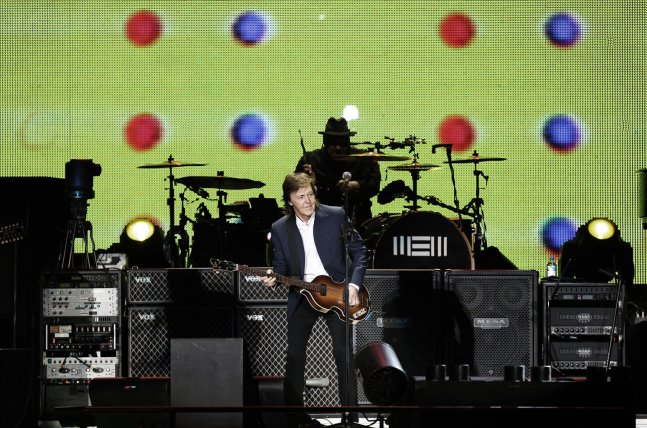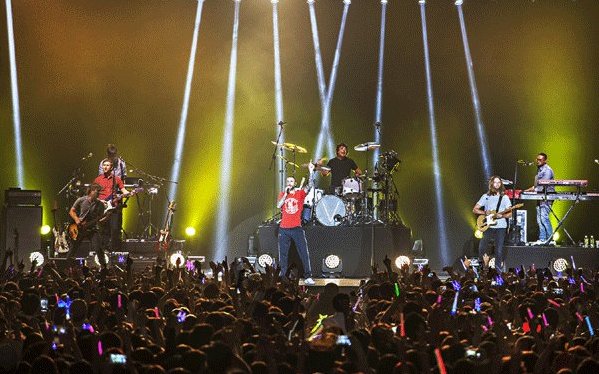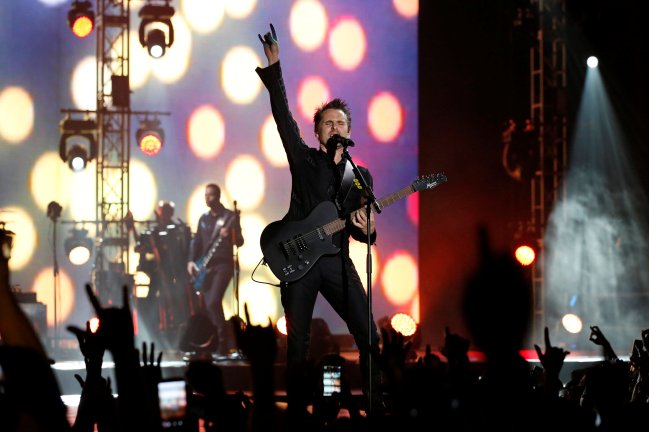Explosive sing-alongs by Korean fans at concert arenas are nothing new to global pop musicians, as they have begun evolving into more articulately planned events.
A slew of world-famous musicians have been elevated by the sight of Korean fans singing along to their hooks, songs and, at times, their signature guitar riffs.
“They were singing all of it (‘Live Forever’), word for word, for their own amusement,” British singer-songwriter Noel Gallagher said in an interview with CBC Radio’s talk show “Q” in May 2015, a month after his Seoul gig.
 |
Legendary Beatle Paul McCartney performs in front of nearly 45,000 fans at his first concert in Korea at the Jamsil Sports Complex in Seoul. (Yonhap) |
“People from the other side of the world who don’t speak English were taking my music and it means so much to them.”
“It is hard to beat the enthusiasm of our amazing Korean fans. We love you!” Adam Levine, vocalist of American band Maroon 5, said on his Instagram account before his fourth gig in Seoul in 2014. Maroon 5 held another concert the following year.
Enthusiastic Korean concertgoers like 26-year-old Jang Hwang-gyu are excited to see the global musicians coming, to the degree that they practice singing along if they don’t already know the songs well enough.
“Usually I can sing along to my favorite musicians’ songs without preparing,” the Seoul resident said.
 |
American pop band Maroon 5’s “V tour” at Seoul’s Olympic Gymnastics Arena (Live Nation Korea) |
“In case I don’t (know much about the musician), I watch the clip of the musician’s live performances (and) listen to the songs until I get familiar with them, anticipating the singalong at the upcoming gig.”
In more recent times, the fun-loving nature of Korean fans has been taking on a high-tech twist.
Tech-savvy Koreans have planned and arranged events online that involve smartphone flashes, sending out paper airplanes and lavishing gold tinsel on the singers, among others, and executed them at the arena.
The fans turn on their phone flash function, sway them in the air and sometimes create huge waves, following the musicians’ hand movements on stage.
Those activities are mostly led by giant Web portal-based online fan communities known as “fan cafes.” Members of the partially public fan communities come up with ideas on a bulletin board, pick some of them together, discuss them with the entertainment agency in charge of the concert, choose when they will carry out the activities and even distribute flyers for guidance and other materials near the venue hours before the concert.
The flashlight event during Muse’s “Mercy” performance at its September 2015 concert was one of many. Flashlights of the 11,000-strong audience were turned on as soon as Muse advanced to the song’s second chorus.
“The idea (of the flashlight event) surfaced as online community members brought up and combined the ideas,” Jang Eun-jin, vice manager of the official Muse fan community in Korea, told The Korea Herald.
 |
British rock band Muse performs at the Olympic Gymnastics Arena in Seoul. (Access Entertainment) |
The vice manager credited the online community members’ imagination for the success of the fan-driven activities.
“I’d like to show appreciation for some dedicated community members who stepped up to lead the event. All I did was announce events to club members and promote them online.”
Additionally, some 3,500 audience members hailed British singer-songwriter Ed Sheeran with flashing lights when he was singing his hit number “Thinking Out Loud” at a March 2015 concert in Seoul.
Onstage performances such as those by British musician Paul McCartney’s ”Let It Be” in May 2015, American rock band Imagine Dragons’ “Demons” in August 2015, Maroon 5’s “Payphone” and American band Bon Jovi’s “Wanted Dead or Alive” in September 2015, as well as British singer-songwriter Mika’s “Underwater” and “Good Guys,” were also greeted with a constellation of flashlights.
“The (audience activities) were all fan-based, all fan-funded,” said Kim Ji-ye from local entertainment firm Private Curve, which took charge of Mika’s Korea tour in February, as the musician made stops in Seoul, Daegu and Busan.
Before fans carry out the event as planned, a technical rider -- a document that indicates a set of requests from a performer -- is required for the agency to confirm their event.
“We cross-check details between the technical rider we received from a musician and the requests from the online fan community.” Kim said. “After that, we talk to the stage director and the local tour manager of the musician for further adjustment of the plan before we confirm this with fans.”
Kim added that all the arrangements are made within a couple of months as they start planning events as soon as tickets go on sale, usually about two months before the concert begins.
“In the case of the Mika concert this year, fans were already aware of what to do, as they are very familiar with it,” she said. “There was little change from fans’ initial plan.”
Local entertainment company Access Entertainment, dedicated to organizing concerts of overseas musicians for nearly two decades, said fans were becoming more organized as more and more musicians have performed in Korea.
“Foreign musicians’ concerts were rare back in (the past in) Korea,” Nam Ka-young from Access Entertainment told The Korea Herald. “But as time went by, we have seen an increase in the number of concerts by artists from around the world in Korea. Moreover, artists tend to revisit Korea after their first concert here, causing fans to become more organized.”
By Son Ji-hyoung (
json@heraldcorp.com)










